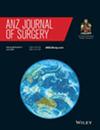The Effects of Gum Chewing in the Postoperative-Period: A Systematic Review and Meta-Analysis
Abstract
Objective
Postoperative ileus (POI) is a transient impairment of gastrointestinal motility occurring after surgery. Patients with POI can suffer from complications such as increased risk of nosocomial infections, overall mortality risk, and higher overall healthcare costs. This study aims to (a) evaluate the effectiveness of gum chewing on relieving POI symptoms (b) conduct meta-analysis on POI outcome variables to estimate overall effect size.
Methods
We searched MEDLINE (Ovid), EMBASE, CINAHL, Web of Science, and Scopus for English language randomized controlled trials (RCTs), evaluating the postoperative effects of gum chewing in adult surgical patients. Two reviewers independently screened titles, abstracts, and full texts, resolving conflicts by discussion. Study quality was assessed using the GRADE system. Meta-analysis was conducted within two surgical specialty subgroups separately.
Results
From 1925 citations, 714 duplicates were removed. After title/abstract screening, 128 proceeded to full text review, out of which 43 studies met the inclusion criteria. Among RCTs, 69.8% noted statistically significant improvement in at least one of the POI outcomes in the intervention cohort. Meta-analysis showed significant reductions in time to first flatus (−7.4 h; p = 0.0003) and defecation (−18.64 h; p < 0.0001) in general and colorectal surgery. Similar reductions were also observed in the OBGYN and gynecology cohort: flatus (−6.52 h; p < 0.0001) and defecation (−9.71 h; p = 0.003).
Conclusion
Chewing gum is a safe low-cost intervention that has the potential to significantly reduce POI symptoms and hospitalization times. Meta-analysis validated the clinical relevance of the intervention. Standardized protocols are still required to delineate true effect sizes and reduce heterogeneity.


 求助内容:
求助内容: 应助结果提醒方式:
应助结果提醒方式:


